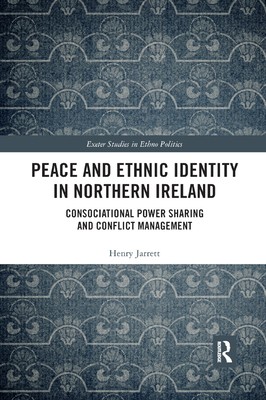
- We will send in 10–14 business days.
- Author: Henry Jarrett
- Publisher: Routledge
- Pages: 184
- ISBN-10: 0367888564
- ISBN-13: 9780367888565
- Format: 15.6 x 23.4 x 1 cm, minkšti viršeliai
- Language: English
- SAVE -10% with code: EXTRA
Reviews
Description
Consociational power sharing is often perceived to be the method of conflict management that is most likely to succeed in deeply divided societies. The case of Northern Ireland in particular is heralded by many as a consociational success story. Since the signing of the Good Friday (Belfast) Agreement in 1998, significant conflict transformation has taken place in the form of a considerable reduction in levels of violence and the establishment of power sharing between unionists and nationalists.
This book looks at what consociational power sharing achieves after its implementation - specifically, whether it can work to overcome existing identities in divided societies, or whether it simply freezes divisions. It argues that if consociational power sharing is facilitating a move towards a genuinely shared society, this would be demonstrated in the focus of the election campaigns of Northern Ireland's political parties, which would be almost exclusively based around socio-economic issues affecting the whole population, rather than narrow single identity concerns. However, the book claims that, on the whole, this has not been realised. Although election campaigns are today less strident than they were in the pre-1998 era, it remains the case that they usually foreground single identity symbolism, as it is this that resonates with voters. Whilst consociational power sharing has been very successful in reducing levels of violent conflict and facilitating elite level cooperation between unionists and nationalists, it has been much less successful in reducing divisions within wider society to facilitate a genuinely shared Northern Irish identity.
By establishing an important middle ground between consociational proponents and critics, this research will be of significant interest to students and scholars of ethnic politics, political sociology, conflict management, and divided societies more generally.
EXTRA 10 % discount with code: EXTRA
The promotion ends in 23d.02:00:17
The discount code is valid when purchasing from 10 €. Discounts do not stack.
- Author: Henry Jarrett
- Publisher: Routledge
- Pages: 184
- ISBN-10: 0367888564
- ISBN-13: 9780367888565
- Format: 15.6 x 23.4 x 1 cm, minkšti viršeliai
- Language: English English
Consociational power sharing is often perceived to be the method of conflict management that is most likely to succeed in deeply divided societies. The case of Northern Ireland in particular is heralded by many as a consociational success story. Since the signing of the Good Friday (Belfast) Agreement in 1998, significant conflict transformation has taken place in the form of a considerable reduction in levels of violence and the establishment of power sharing between unionists and nationalists.
This book looks at what consociational power sharing achieves after its implementation - specifically, whether it can work to overcome existing identities in divided societies, or whether it simply freezes divisions. It argues that if consociational power sharing is facilitating a move towards a genuinely shared society, this would be demonstrated in the focus of the election campaigns of Northern Ireland's political parties, which would be almost exclusively based around socio-economic issues affecting the whole population, rather than narrow single identity concerns. However, the book claims that, on the whole, this has not been realised. Although election campaigns are today less strident than they were in the pre-1998 era, it remains the case that they usually foreground single identity symbolism, as it is this that resonates with voters. Whilst consociational power sharing has been very successful in reducing levels of violent conflict and facilitating elite level cooperation between unionists and nationalists, it has been much less successful in reducing divisions within wider society to facilitate a genuinely shared Northern Irish identity.
By establishing an important middle ground between consociational proponents and critics, this research will be of significant interest to students and scholars of ethnic politics, political sociology, conflict management, and divided societies more generally.


Reviews